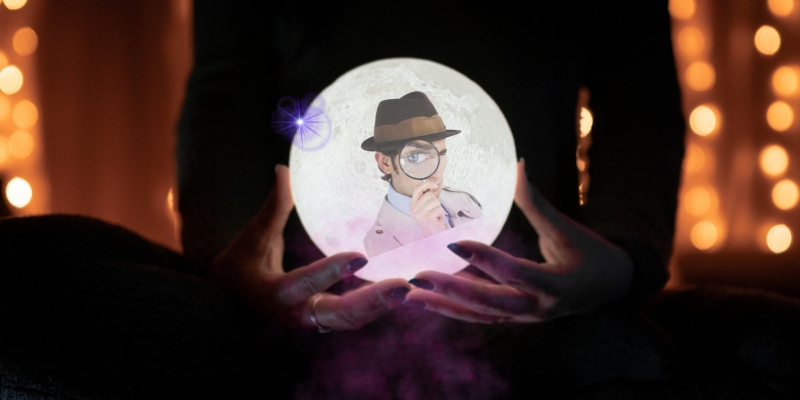Mankind’s desire to see into the murky future has been reflected in literature for centuries.
No Greek hero worth their salt would venture forth on a quest without first consulting an oracle. Soothsayers and witches provided foreshadowing in Shakespeare’s plays, and the literature of the nineteenth century was rife with supernatural references to card readings, palmistry, crystal gazing, and scrying.
The interest in fortune-telling shifted a bit in the twentieth century, and while many books on the subject were published as parlor game guides, some novelists used mysticism as social commentary. Including a female character who was also a mystic was a way of illuminating the limited roles for working-class women, for example.
Our fascination with what fate has in store gave rise to plenty of frauds and charlatans. The hope and doubt behind every psychic reading or fortune cookie slip is what makes the topic both layered in complexity and vastly entertaining. It’s the stirring of emotions—evoking ghosts of the past while trying to determine what lies ahead in the future—that make fortune telling a perfect theme for a mystery novel.
My interest in the topic began in New Orleans sometime in the mid 1980s. I was vacationing with my family when I noticed a man sitting on the sidewalk outside the restaurant we were bound for. It wasn’t in my nature to talk to strangers, but I was oddly drawn to this person.
I couldn’t tell you what he looked like, but I can remember his finger tracing the lines of my palm. He told me I would not follow my passion right away. I would spend years doing other things first. Eventually, however, I would have a career as a storyteller.
He told me my husband’s name would start with “T,” and that I would have two children. He was right about all of this and more. Some of his predictions were positive. But some hinted at grief and specific disappointments I’d yet to experience.
Inspired by this stranger from my past, I added a psychic medium-turned memoir author to my upcoming novel, The Tattered Cover. I wanted readers to question the veracity of Lara Luz’s abilities while also being captivated by her personal history. Whether she can hear messages from the dead is less important than her relationship to the living. After all, only those existing on this side of the veil are capable of committing murder.
As the days grow shorter, and readers find themselves cradling mugs of hot tea or adding another log to the fire, the question of what to read next might rise up the chimney to mingle with the autumnal air:
There’s no need for consult a Magic 8 Ball or look under the couch cushions for quarters for Zoltar’s machine. I can answer that question for you here and now with a list of mysteries and thrillers you’ll want to add to your TBR pile.
No list of fictional psychics would be complete without mentioning one of my favorite Stephen King novels, The Dead Zone. When Johnny Smith wakes after a long coma, he’s surprised to find that he has clairvoyant abilities that are activated by touch. Johnny brings warmth and sensitivity to some very dark situations.
It’s no wonder this novel was adapted for film (starring Christopher Walken) and for television (starring Anthony Michael Hall). Some stories age well, and this is one of them.
King isn’t the only author to create a protagonist with a life-changing brain injury. In Lisa Unger’s collection of short stories, The Whispering Hollows, Eloise Montgomery survives the terrifying accident that claimed the lives of her husband and eldest daughter.
Though injured and grief-stricken, Eloise is determined to heal and lend strength, love, and support to her youngest daughter. However, it’s hard to Eloise to find firm footing in the face of her new and unsettling psychic abilities. As Eloise’s tale unfolds, it is unclear whether these abilities are a gift or a curse.
Unger’s fictional town in upstate New York is so vibrant that it’s practically its own character, and each investigation will have readers becoming more and more invested in the people and mysteries of The Hollow.
Agatha Christie was also fond of fortune telling themes as evidenced by the following short stories: “The Séance,” “The King of Clubs,” and “The Blue Geranium.” In the novel Dead Man’s Folly, Poirot attends a village fête where he receives a reading from a fortune teller named Madame Zuleika. The prediction is rather chilling considering the hosts of the fête, Sir Goerge and Lady Stubbs, intend to stage a mock murder mystery. It’s all fun and games until someone ends up dead.
Moving from a village fête to a literary festival on the island of Alderney, one of Anthony Horowitz’s prime suspects in A Line to Kill is a blind psychic named Mrs. Abbott. Abbott claims to hear voices from the spirit world and is just one of several rather eccentric suspects who confound ex-detective Daniel Hawthorne and long-suffering crime writer, Anthony Horowitz, in this quick-paced locked-room mystery.
Cozy readers will revel in Victoria Laurie’s Psychic Eye Mysteries featuring amateur sleuth, Abby Cooper. This long-standing series currently boasts seventeen entries, a testament to Laurie’s ability to infuse Abby’s character with charm and vulnerability and to entrance fans with clever puzzles, a dash or romance, and the fascination of Abby’s intuitive readings.
Not only is Laurie a prolific novelist, but she is also a practicing psychic medium. To learn more about her services, visit https://www.victorialaurie.com.
Finally, no list about fictional psychics would be complete without the Harper Connelly series by Charlaine Harris. After being struck by lightning, Harper can sense things about the dead.
And while she may know how these poor souls met their end, she cannot identify their killers. Luckily, she and her stepbrother, Tolliver, make it their business to solve crimes and bring closure to the living (for a modest fee).
I hope this list guides you toward a future of suspenseful and thought-provoking reads.
***


















